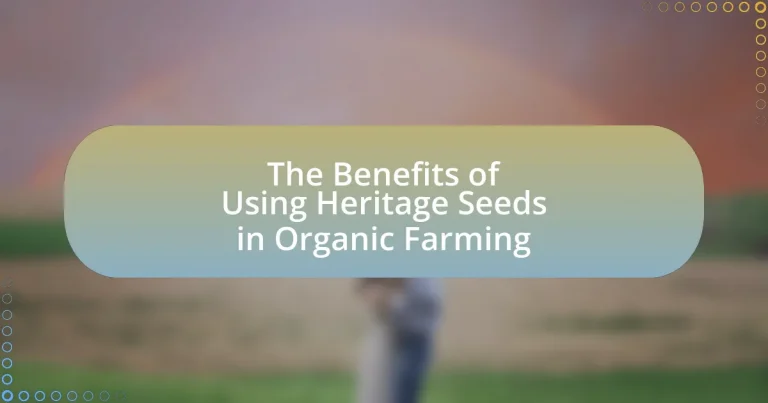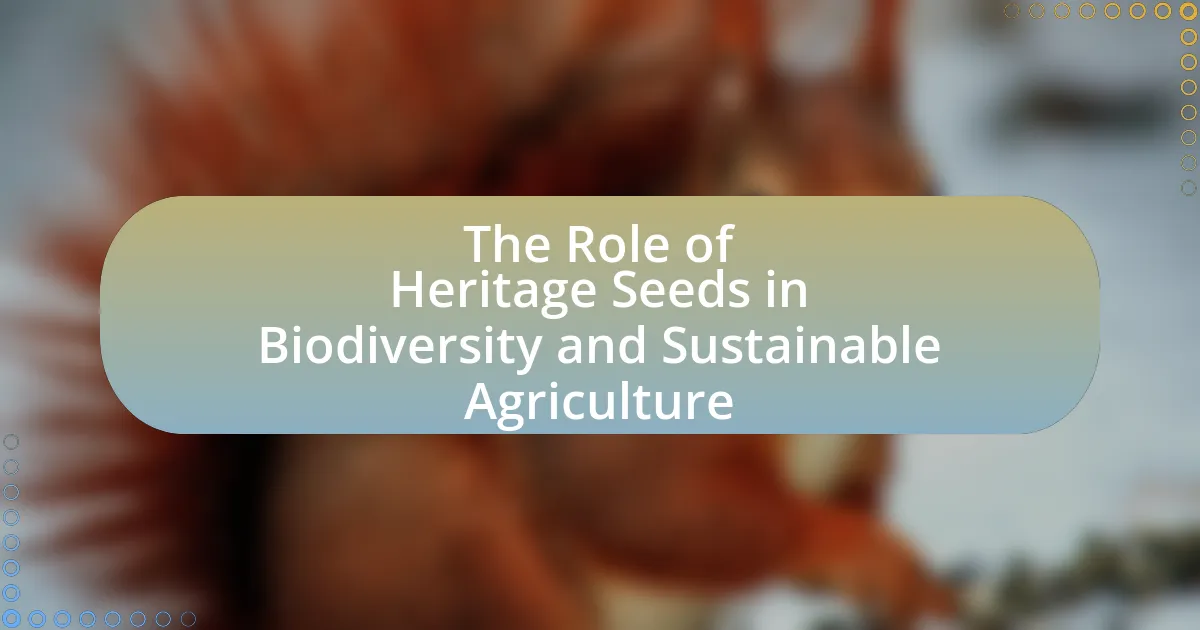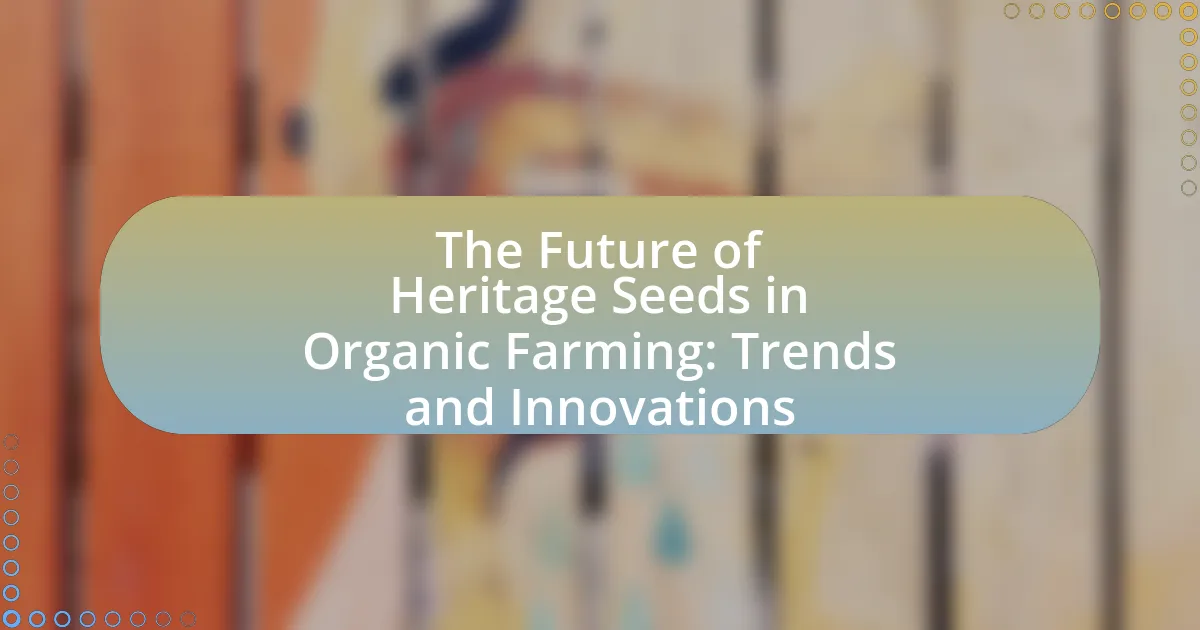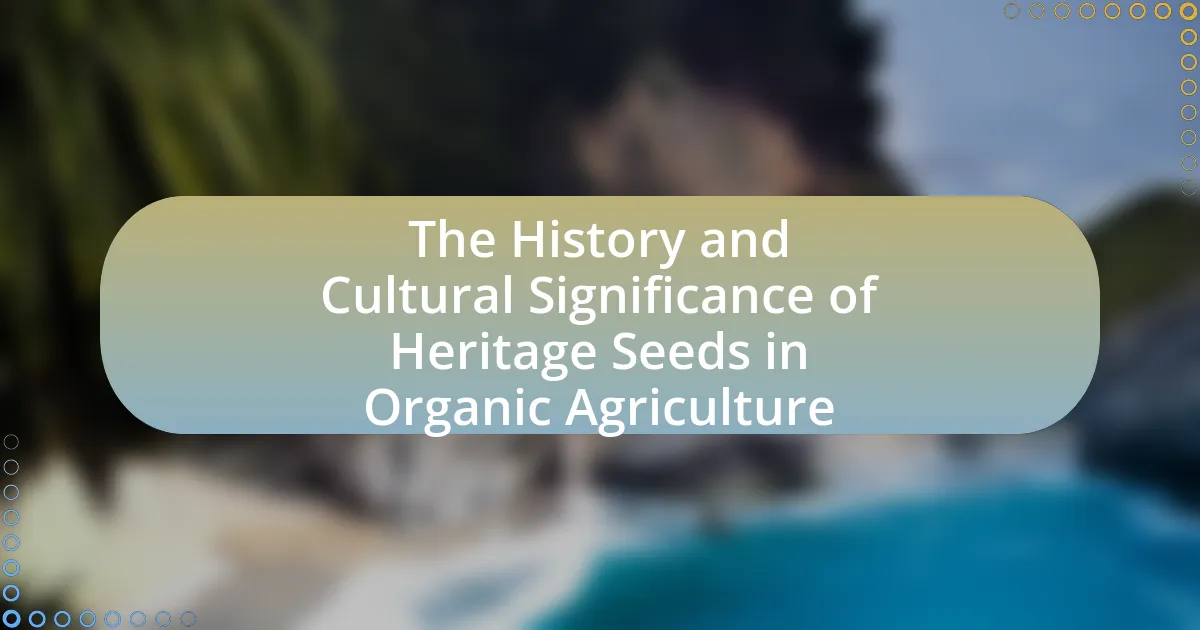Heritage seeds are traditional, open-pollinated seed varieties that have been preserved through generations, playing a vital role in organic farming. They enhance biodiversity, improve soil health, and provide resilience against pests and diseases, making them essential for sustainable agricultural practices. This article explores the differences between heritage seeds and hybrid or GMO seeds, their characteristics, and their contributions to ecosystem health and food security. Additionally, it addresses the economic advantages for organic farmers, challenges in sourcing heritage seeds, and best practices for their use, highlighting the importance of preserving genetic diversity in agriculture.
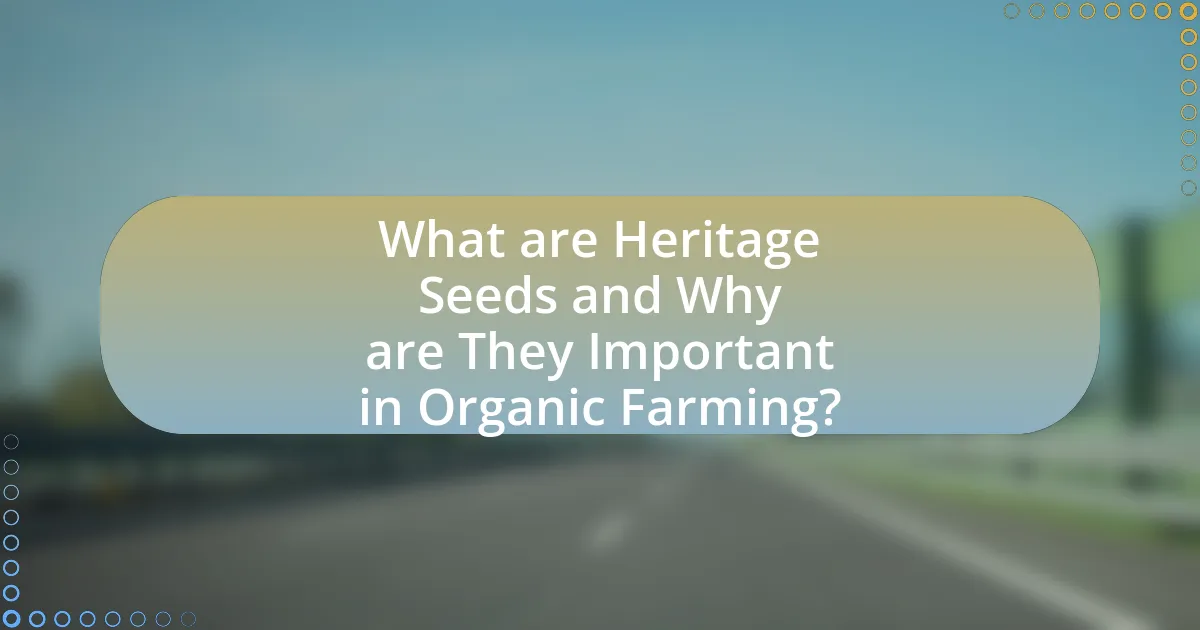
What are Heritage Seeds and Why are They Important in Organic Farming?
Heritage seeds are traditional seed varieties that have been passed down through generations, often characterized by their open-pollinated nature, which allows them to reproduce true to type. These seeds are important in organic farming because they promote biodiversity, enhance soil health, and provide resilience against pests and diseases. Studies show that heritage seeds can adapt better to local growing conditions, leading to improved yields and reduced reliance on chemical inputs. Additionally, using heritage seeds supports sustainable agricultural practices and preserves genetic diversity, which is crucial for food security.
How do Heritage Seeds differ from Hybrid and GMO Seeds?
Heritage seeds differ from hybrid and GMO seeds primarily in their genetic makeup and breeding processes. Heritage seeds are open-pollinated varieties that have been passed down through generations, maintaining their genetic integrity and traits over time, while hybrid seeds are created through controlled cross-pollination of different plant varieties to produce specific characteristics, and GMO seeds are genetically modified through biotechnology to introduce traits that do not occur naturally. Heritage seeds often exhibit greater biodiversity and adaptability to local conditions, whereas hybrids may offer uniformity and higher yields, and GMOs can provide resistance to pests and herbicides. The preservation of heritage seeds supports sustainable agriculture and biodiversity, as evidenced by their use in organic farming practices that prioritize natural growing methods and ecosystem health.
What characteristics define Heritage Seeds?
Heritage seeds are defined by their open-pollinated nature, which allows them to be naturally pollinated and produce seeds that are true to type. These seeds are typically heirloom varieties, often passed down through generations, and are known for their genetic diversity, adaptability to local growing conditions, and rich flavors. Historical records indicate that many heritage seeds have been cultivated for over 50 years, ensuring they possess traits that are well-suited for organic farming practices, such as resilience to pests and diseases.
Why are Heritage Seeds considered more sustainable?
Heritage seeds are considered more sustainable because they promote biodiversity and are adapted to local growing conditions. These seeds have been passed down through generations, allowing them to develop resilience against pests and diseases, which reduces the need for chemical interventions. Additionally, heritage seeds can be saved and replanted, fostering self-sufficiency among farmers and reducing reliance on commercial seed suppliers. Studies indicate that using heritage seeds can enhance soil health and ecosystem stability, contributing to sustainable agricultural practices.
What role do Heritage Seeds play in biodiversity?
Heritage seeds play a crucial role in biodiversity by preserving genetic diversity within plant species. These seeds, often heirloom varieties, maintain traits that are adapted to local environments and resist pests and diseases, contributing to a more resilient ecosystem. Research indicates that heritage seeds can enhance soil health and promote a wider range of pollinators, which are essential for food production. By cultivating these seeds, farmers can support agricultural biodiversity, ensuring the survival of various plant species and their associated ecosystems.
How do Heritage Seeds contribute to ecosystem health?
Heritage seeds contribute to ecosystem health by promoting biodiversity and enhancing soil fertility. These seeds are often heirloom varieties that have been cultivated for generations, leading to a diverse gene pool that supports various plant and animal species. Research indicates that increased biodiversity from heritage seeds can improve ecosystem resilience, allowing for better adaptation to environmental changes. Additionally, heritage seeds typically require fewer chemical inputs, which reduces soil and water contamination, further supporting a healthier ecosystem. Studies have shown that organic farming practices utilizing heritage seeds can lead to improved soil structure and nutrient cycling, which are essential for maintaining ecosystem health.
What are the implications of losing biodiversity in agriculture?
Losing biodiversity in agriculture leads to decreased resilience of ecosystems, which can result in reduced crop yields and increased vulnerability to pests and diseases. This decline in genetic diversity limits the ability of crops to adapt to changing environmental conditions, such as climate change, and can lead to food insecurity. For instance, studies have shown that monoculture practices, which arise from reduced biodiversity, can lead to significant yield losses during pest outbreaks, as diverse crops can better withstand such pressures. Additionally, the loss of biodiversity can disrupt ecosystem services, such as pollination and soil health, which are crucial for sustainable agricultural practices.
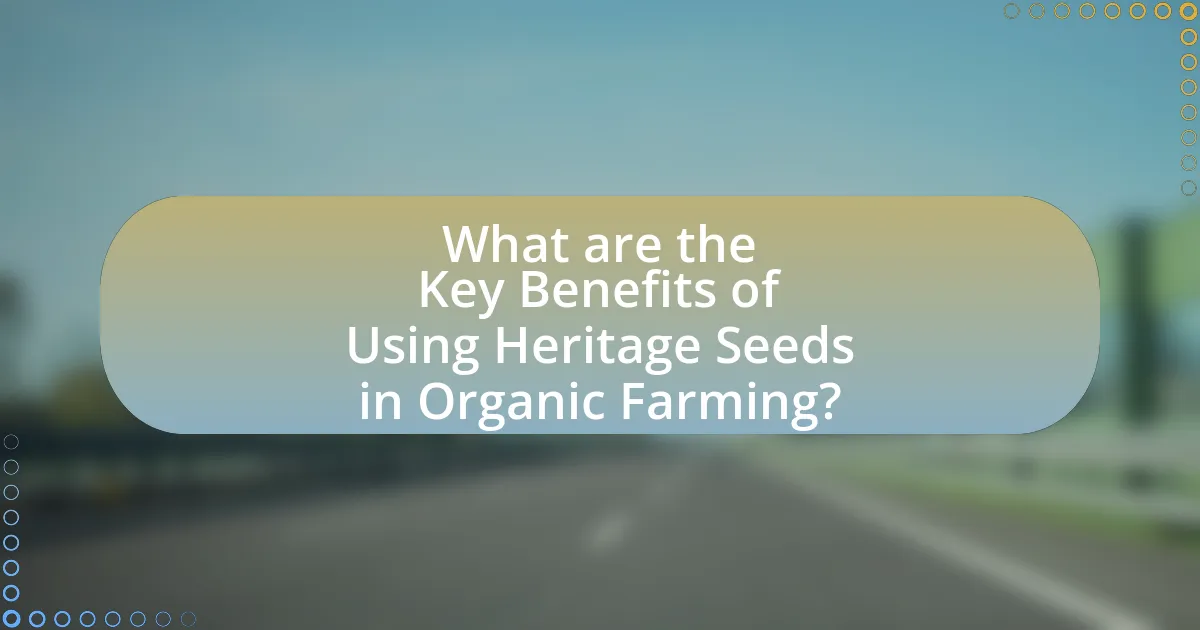
What are the Key Benefits of Using Heritage Seeds in Organic Farming?
Heritage seeds provide several key benefits in organic farming, including enhanced biodiversity, improved resilience to pests and diseases, and superior flavor and nutritional quality. These seeds are often open-pollinated, allowing farmers to save seeds from their crops for future planting, which promotes sustainability and reduces dependency on commercial seed suppliers. Research indicates that heritage varieties can adapt better to local growing conditions, leading to increased yields and reduced need for chemical inputs. Additionally, heritage seeds contribute to the preservation of genetic diversity in agriculture, which is crucial for food security and ecosystem health.
How do Heritage Seeds enhance soil health?
Heritage seeds enhance soil health by promoting biodiversity and improving soil structure. These seeds are often adapted to local conditions, which allows them to thrive without the need for synthetic fertilizers or pesticides, thereby maintaining a balanced ecosystem. Research indicates that diverse plant varieties contribute to healthier soil microbiomes, which are essential for nutrient cycling and soil fertility. For example, a study published in the journal “Agriculture, Ecosystems & Environment” found that crop diversity, including heritage varieties, significantly increased soil organic matter and microbial activity, leading to improved soil health.
What specific nutrients do Heritage Seeds provide to the soil?
Heritage seeds provide essential nutrients to the soil, including nitrogen, phosphorus, and potassium. These seeds contribute to soil fertility through their natural growth processes, as they often have deeper root systems that enhance nutrient uptake and improve soil structure. Additionally, when heritage plants decompose, they release organic matter that enriches the soil with micronutrients and enhances microbial activity, further promoting soil health. Studies have shown that diverse plant varieties, such as those from heritage seeds, can improve soil nutrient profiles and overall ecosystem resilience.
How does soil health impact crop yield?
Soil health directly impacts crop yield by influencing nutrient availability, water retention, and microbial activity. Healthy soil contains a balanced composition of organic matter, minerals, and microorganisms, which enhances its ability to support plant growth. For instance, research indicates that soils with high organic matter can increase crop yields by 20-30% due to improved nutrient cycling and moisture retention. Additionally, healthy soils promote beneficial microbial communities that help plants resist diseases and pests, further contributing to higher yields.
What economic advantages do Heritage Seeds offer to organic farmers?
Heritage seeds provide economic advantages to organic farmers by enhancing crop resilience and reducing input costs. These seeds are often adapted to local growing conditions, which can lead to higher yields and lower reliance on chemical inputs. For instance, studies have shown that heritage varieties can be more resistant to pests and diseases, thereby decreasing the need for pesticides. Additionally, organic farmers can save money by using seeds from their own harvests, as heritage seeds are open-pollinated and can be replanted year after year without the need to purchase new seeds annually. This practice not only cuts costs but also promotes biodiversity and sustainability within farming systems.
How can Heritage Seeds reduce farming costs?
Heritage seeds can reduce farming costs by promoting biodiversity and resilience, which leads to lower input costs and reduced dependency on chemical fertilizers and pesticides. These seeds are often adapted to local conditions, requiring fewer resources for growth and resulting in higher yields without the need for expensive agricultural inputs. Studies have shown that farms using heritage seeds can save up to 30% on seed costs due to their ability to be saved and replanted year after year, unlike hybrid seeds that must be purchased annually. Additionally, heritage varieties often exhibit greater resistance to pests and diseases, further decreasing the need for costly chemical treatments.
What is the market demand for Heritage Seed varieties?
The market demand for Heritage Seed varieties is increasing, driven by consumer interest in organic farming and sustainable agriculture. A report from the Organic Trade Association indicates that organic food sales reached $62 billion in 2020, reflecting a growing preference for products that utilize traditional seed varieties. Additionally, the rise in awareness about biodiversity and the nutritional benefits of Heritage Seeds contributes to their popularity among farmers and consumers alike. This trend is supported by data from the Seed Savers Exchange, which shows a significant increase in the number of Heritage Seed varieties being cultivated and sold, indicating a robust market demand.

What Challenges Do Farmers Face When Using Heritage Seeds?
Farmers face several challenges when using heritage seeds, including lower yields compared to hybrid varieties, susceptibility to pests and diseases, and limited availability of seeds. Heritage seeds often produce less than modern hybrids, which can impact overall productivity. Additionally, these seeds may lack the genetic resistance to certain pests and diseases, making crops more vulnerable and potentially leading to increased reliance on pesticides. Furthermore, the availability of heritage seeds can be inconsistent, as they are often produced by smaller seed companies or local farmers, which can complicate sourcing for larger farming operations.
What are the common misconceptions about Heritage Seeds?
Common misconceptions about heritage seeds include the belief that they are less productive than hybrid seeds, that they are more susceptible to diseases, and that they are difficult to grow. In reality, heritage seeds can produce yields comparable to hybrids, as many heritage varieties have been selectively bred for resilience and adaptability over generations. Additionally, while some heritage seeds may have specific vulnerabilities, many are actually more robust due to their genetic diversity, which can enhance disease resistance. Furthermore, heritage seeds are not inherently difficult to grow; they often thrive in organic farming systems that prioritize soil health and biodiversity, making them suitable for a wide range of growing conditions.
How do these misconceptions affect farmer choices?
Misconceptions about heritage seeds lead farmers to overlook their benefits, resulting in choices that favor conventional seeds. Farmers may believe that heritage seeds yield less or are less resilient to pests, which can deter them from adopting these varieties. Research indicates that heritage seeds can offer higher nutritional value and better adaptability to local conditions, yet misconceptions persist. For instance, a study by the University of California found that heritage varieties often outperform hybrids in specific environments, demonstrating their potential for sustainable farming. Thus, these misconceptions significantly limit farmers’ decisions, preventing them from maximizing the advantages of heritage seeds in organic farming.
What educational resources are available to combat these misconceptions?
Educational resources available to combat misconceptions about heritage seeds in organic farming include online courses, workshops, and informational websites. For instance, organizations like Seed Savers Exchange provide extensive resources, including guides and webinars that educate farmers and consumers about the benefits and importance of heritage seeds. Additionally, universities often offer extension programs that focus on sustainable agriculture practices, including the use of heritage seeds, which can help dispel myths and provide factual information. Research studies, such as those published in the Journal of Sustainable Agriculture, also serve as valuable resources by presenting data on the ecological and economic advantages of heritage seeds, further reinforcing their significance in organic farming.
How can farmers overcome the challenges of sourcing Heritage Seeds?
Farmers can overcome the challenges of sourcing Heritage Seeds by establishing connections with local seed banks and participating in seed exchanges. These initiatives provide access to a diverse range of heritage varieties that are often not available through commercial channels. For instance, the Seed Savers Exchange, a nonprofit organization, facilitates the sharing of heirloom seeds among farmers and gardeners, promoting biodiversity and preserving traditional varieties. Additionally, farmers can collaborate with agricultural organizations and universities that focus on heritage seed preservation, which can offer resources and support for sourcing these seeds effectively.
What strategies can be employed to find reliable Heritage Seed suppliers?
To find reliable Heritage Seed suppliers, one effective strategy is to research and connect with local agricultural cooperatives and organic farming associations. These organizations often have established networks and can provide recommendations for reputable suppliers who specialize in Heritage Seeds. Additionally, attending seed swaps and agricultural fairs can facilitate direct interactions with seed producers, allowing for firsthand evaluation of their offerings and practices. Furthermore, utilizing online platforms that focus on organic and heirloom seeds, such as Seed Savers Exchange, can yield trustworthy suppliers, as these platforms typically vet their members for quality and authenticity.
How can farmers network to share Heritage Seed varieties?
Farmers can network to share Heritage Seed varieties through community seed exchanges, online platforms, and local agricultural organizations. Community seed exchanges allow farmers to trade seeds directly, fostering relationships and knowledge sharing. Online platforms, such as social media groups and dedicated websites, facilitate broader connections and information dissemination about Heritage Seeds. Local agricultural organizations often host workshops and events that encourage networking among farmers, providing opportunities to share seeds and cultivation techniques. These methods enhance biodiversity and preserve traditional farming practices, which are crucial for sustainable agriculture.
What Best Practices Should Farmers Follow When Using Heritage Seeds?
Farmers should prioritize genetic diversity, proper seed saving techniques, and organic farming practices when using heritage seeds. Genetic diversity enhances resilience against pests and diseases, which is crucial for sustainable agriculture. Proper seed saving techniques, such as selecting seeds from the healthiest plants and ensuring they are stored in a cool, dry place, help maintain the integrity of heritage varieties. Additionally, adhering to organic farming practices, including avoiding synthetic fertilizers and pesticides, supports the natural growth of heritage crops and promotes soil health. These best practices are supported by studies indicating that diverse genetic resources can lead to improved crop yields and sustainability in organic farming systems.
